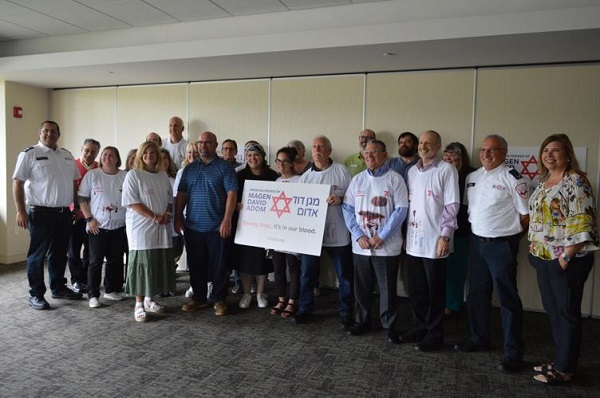06/27/2023
‘First 7 Minutes’ Helps Train Community, Jewish Professionals
- Share This Story

About 20 community members participated in the Jewish Federation of Cleveland’s morning session of Magen David Adom’s “First 7 Minutes” training. CJN Photo / Courtney Byrnes
COURTNEY BYRNES
Article reprinted with permission from Cleveland Jewish News
Community members and local Jewish professionals took part in a life-saving training program called “First 7 Minutes” June 22 at the Jewish Federation of Cleveland in Beachwood.
The training, developed by Magen David Adom, Israel’s National EMS organization, was offered by the Federation, its community relations committee and JFC Security, LLC, the Federation’s security provider. Two sessions were held throughout the day as participants listened to lectures from Magen David Adon’s Yoni Yagodovsky, senior paramedic and director of international relations, and Raphael Herbst, senior paramedic and trainer, followed by a hands-on exercise to apply what they learned.
“We had representatives of probably a dozen or more community institutions, and there’ll be a session this afternoon that will bring in a similar group,” Keith Libman, Federation’s security committee chair, told the Cleveland Jewish News following the morning session. “By bringing into Federation maybe a couple of dozen organizations in the span of one day to not only learn some of the hands-on techniques, but to understand what the issues are, that will encourage those organizations to reach out to get even more training to be more sensitized to the issues. So, in a relatively short period of time with just several dozen people, we’ll probably end up reaching hundreds.”
The name of the program refers to the seven minutes it typically takes for first responders to arrive, and teaches participants how to remain safe and render critical first aid and other assistance during that time following an attack. Instead of focusing on specific protocols, the training covered seven principles for the first seven minutes: safety, call for help, saving lives together, organizing the scene, bleeding control, report and assisting EMS.
Herbst led the training as he shared real-life examples and laid out scenarios for participants to work through, demonstrating the need to take lead and assign roles, be specific and give as much information when calling 911, and work together to organize a scene based on needs.
Jeff Robertson, deputy director JFC Security, told the CJN this was the first time the community has held this specific training, but regularly has other trainings like Project Safe Classroom - Stop the Bleed.
“We have, as I mentioned in the training, Project Safe Classroom that we teach where we go to all the schools, synagogues, institutions in the community and we teach the Stop the Bleed curriculum,” Robertson said. “This taught today is a little broader than our Stop the Bleed, Project Safe Classroom program, but it’s an excellent add on, and I’ll be incorporating some of what I learned today into our Stop the Bleed training.”
While different than some of the other safety and security training JFC Security provides, he said it would be very advantageous to the community to host the training again and reach out to a bigger group.
Libman also added the importance of not only this and other trainings, but to continue to reinforce the training to keep the community safe.
“This was one type of training,” Libman said. “One of the most important things that we can do to protect our community is to train, and train again, and reinforce it, whether it’s on large-scale incidents such as they described today or just how to keep your building safe. Today was about when something bad happened. There’s also training on how to avoid something that happened, and you just need everyone to understand that’s at the highest priority of Federation is to provide those training resources to the community.”
Robertson added JFC Security offers trainings typically Monday through Thursday in the evenings or during business hours during the week, and those interested in setting up a training for their institution should call JFC Security.

